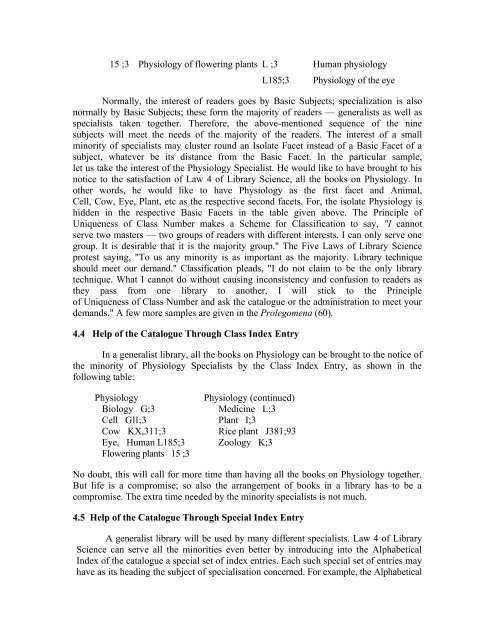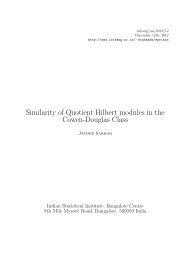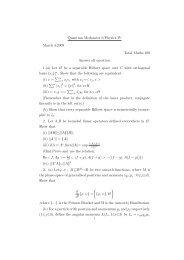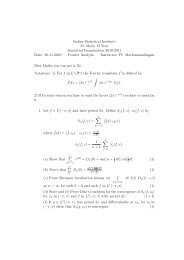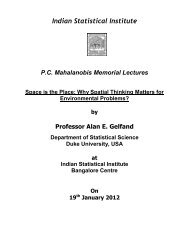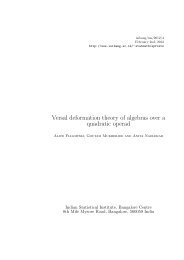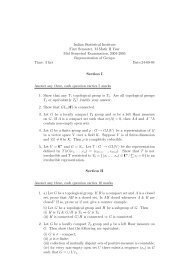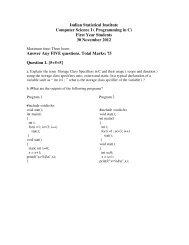CHOICE OF SCHEME FOR CLASSIFICATION - Indian Statistical ...
CHOICE OF SCHEME FOR CLASSIFICATION - Indian Statistical ...
CHOICE OF SCHEME FOR CLASSIFICATION - Indian Statistical ...
Create successful ePaper yourself
Turn your PDF publications into a flip-book with our unique Google optimized e-Paper software.
15 ;3 Physiology of flowering plants L ;3 Human physiology<br />
L185;3 Physiology of the eye<br />
Normally, the interest of readers goes by Basic Subjects; specialization is also<br />
normally by Basic Subjects; these form the majority of readers — generalists as well as<br />
specialists taken together. Therefore, the above-mentioned sequence of the nine<br />
subjects will meet the needs of the majority of the readers. The interest of a small<br />
minority of specialists may cluster round an Isolate Facet instead of a Basic Facet of a<br />
subject, whatever be its distance from the Basic Facet. In the particular sample,<br />
let us take the interest of the Physiology Specialist. He would like to have brought to his<br />
notice to the satisfaction of Law 4 of Library Science, all the books on Physiology. In<br />
other words, he would like to have Physiology as the first facet and Animal,<br />
Cell, Cow, Eye, Plant, etc as the respective second facets. For, the isolate Physiology is<br />
hidden in the respective Basic Facets in the table given above. The Principle of<br />
Uniqueness of Class Number makes a Scheme for Classification to say, "I cannot<br />
serve two masters — two groups of readers with different interests. I can only serve one<br />
group. It is desirable that it is the majority group." The Five Laws of Library Science<br />
protest saying, "To us any minority is as important as the majority. Library technique<br />
should meet our demand." Classification pleads, "I do not claim to be the only library<br />
technique. What I cannot do without causing inconsistency and confusion to readers as<br />
they pass from one library to another, I will stick to the Principle<br />
of Uniqueness of Class Number and ask the catalogue or the administration to meet your<br />
demands." A few more samples are given in the Prolegomena (60).<br />
4.4 Help of the Catalogue Through Class Index Entry<br />
In a generalist library, all the books on Physiology can be brought to the notice of<br />
the minority of Physiology Specialists by the Class Index Entry, as shown in the<br />
following table:<br />
Physiology Physiology (continued)<br />
Biology G;3 Medicine L;3<br />
Cell Gll;3 Plant I;3<br />
Cow KX,311;3 Rice plant J381;93<br />
Eye, Human L185;3 Zoology K;3<br />
Flowering plants 15 ;3<br />
No doubt, this will call for more time than having all the books on Physiology together.<br />
But life is a compromise; so also the arrangement of books in a library has to be a<br />
compromise. The extra time needed by the minority specialists is not much.<br />
4.5 Help of the Catalogue Through Special Index Entry<br />
A generalist library will be used by many different specialists. Law 4 of Library<br />
Science can serve all the minorities even better by introducing into the Alphabetical<br />
Index of the catalogue a special set of index entries. Each such special set of entries may<br />
have as its heading the subject of specialisation concerned. For example, the Alphabetical


